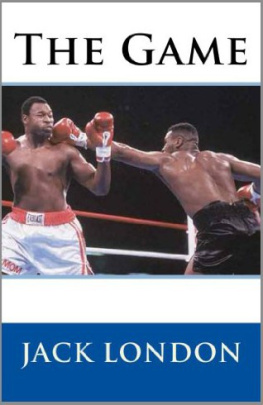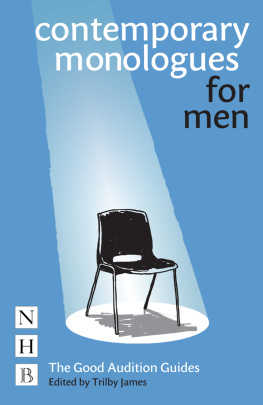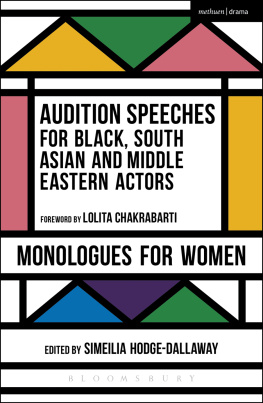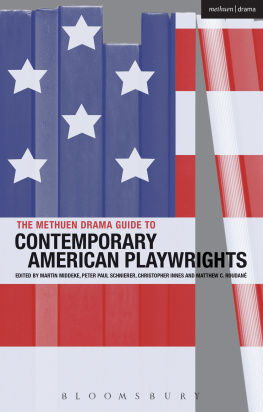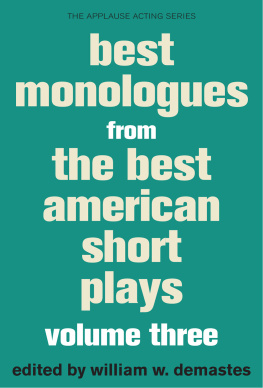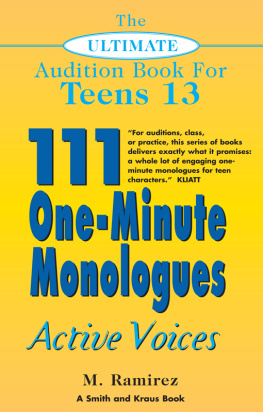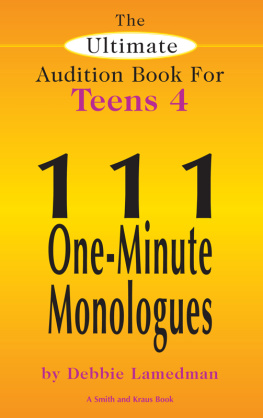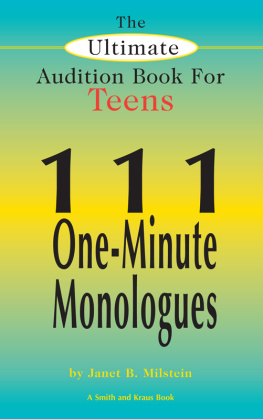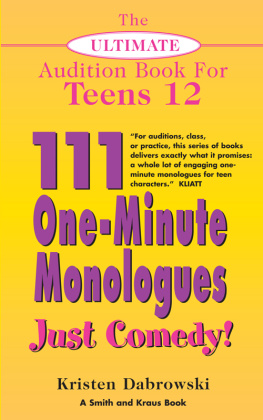CONTEMPORARY
AMERICAN
MONOLOGUES
FOR MEN
CONTEMPORARY
AMERICAN
MONOLOGUES
FOR MEN
EDITED BY TODD LONDON
THEATRE COMMUNICATIONS GROUP
Copyright 1998 by Theatre Communications Group, Inc.
Introduction, An Actor Chooses, and monologue introductions copyright 1998 by Todd London.
Contemporary Monologues for Men is published by Theatre Communications Group, Inc., 520 Eighth Ave., 24th Floor, New York, NY 100184156.
All rights reserved. Except for brief passages quoted in newspaper, magazine, radio or television reviews, no part of this book may be reproduced in any form or by any means, electronic or mechanical, including photocopying or recording, or by an information storage and retrieval system, without permission in writing from the publisher.
Professionals and amateurs are hereby warned that this material, being fully protected under the Copyright Laws of the United States of America and all other countries of the Berne and Universal Copyright Conventions, is subject to a royalty. All rights including, but not limited to, professional, amateur, recording, motion picture, recitation, lecturing, public reading, radio and television broadcasting, and the rights of translation into foreign languages are expressly reserved. Particular emphasis is placed on the question of readings and all uses of these plays by educational institutions, permission for which must be secured from the authors representative in writing.
Owing to limitations of space, all individual copyrights, authors representatives and contact information is included in the Further Reading chapter at the end of the book.
This publication is made possible in part with public funds from the New York State Council on the Arts, a State Agency.
TCG books are exclusively distributed to the book trade by Consortium Book Sales and Distribution.
Library of Congress Cataloging-in-Publication Data
Contemporary American monologues for men / Todd London, editor.
1st ed.
p. cm.
Includes bibliographical references.
ISBN-13: 978-1-55936-762-2
1. ActingAuditions. 2. Monologues. 3. American drama20th century. 4. Mendrama. I. London, Todd.
PN2080.C645 1997
812.04508081dc21
975738
CIP
Cover design by Paula Scher
Book design and composition by Lisa Govan
First Edition, April 1998
Sixth Printing, February 2008
ACKNOWLEDGMENTS
The playwrights whose words appear in this volume are, of course, its authors. They have been consistently encouraging, generous and remarkably tolerant of the piecework Ive made of their art. Im grateful to them all.
Special thanks to Nancy C. Jones, Kerry Lowe and Timothy Mennel, who did much of the hard labor on this book. Thanks, too, to Gino Dilorio, Daniel Swee, the writers and staff of New Dramatists and, especially, Terry Nemeth.
My deepest appreciation goes, always, to Juanita and Guthrie.
Editors note: Many of the monologues that follow have been cobbled together to make sense out of context. Where lines of dialogue or stage directions have been cut, three open boxes
 mark the deletion.
mark the deletion.
CONTENTS
This collection has a simple aim: to make matches. Youre an actor searching for the right monologuefor auditions or acting classand here are cuttings from dozens of the most exciting American plays of the past two decades. The material might be said to be searching, too. Its on the lookout for actors who will connect deeply, who have the emotional availability and the craft to deliver these monologues into the world with their complexity intact. It seeks actors who think on their feet, who understand in their bodies the impression contemporary life makes on a character. Like any matchmaker, though, this book offers only an introduction. The work is left to you.
Some of the excerpts collected here will read like nothing else youve found. Some are more difficult than others, some more strange, but they all offer a freshness of voice, an originality that can be fully felt/heard/appreciated only in context. So, I encourage you, once youve discovered a monologue you like (or two or ten), to read the complete play. (In the interview that follows, Daniel Swee, one of New York theatres most respected and experienced casting directors, says that without reading the play, youre exploring a town without a map.) Theyre all published and easy to lay hands on.
This volume gathers solos from well-made plays, autobiographical performances, experimental playwriting and unabashedly political theatre. Often, these scripts mix dramatic or tragic tones with comic and farcical oneseven in the same monologue. Thematically, too, while many of these writers tackle matters of life and death, love and lossthemes with great traditions in the theatrethey also go where plays havent gone in quite the same way before. Racial and sexual identity, cannibalism, cross-dressing, corporate brutality, pedophilia, cockfighting, AIDS, spiritual revelationits all here, dished up with fierce intelligence and terrific wit. You cant make rich sense of any of it from a single speech.
This book assumes not only that you love to act but also that you love to read plays. Thats one of the reasons its divided into named chapters instead of into more standard categories, such as by age range or, tragic and comic. Also, more than a few of these monologues can be played in a variety of ways by a variety of types of actors. As mentioned above, the sensibilities of contemporary playwriting make it harder, too, to classify works as comic or dramatic. Is it merely funny to watch a clown suffer a heart attack at a birthday party while desperately singing A hundred bottles of milk on the wall? What about a guy in a Santa suit who punctuates his plans to assassinate the president with songs from West Side Story or a Nazi leader who cracks jokes before his trial for crimes against humanity?
These monologues are grouped (and the groups titled) with the hope of sparking an immediate connection. Theyre organized by subject (men and work, early loves, dealing with a father or being one), by emotional impulse (Im dying, thats whats wrong) and by action (I thought of killing people). Some headings are designed to suggest a common thread of character or predicamentI choose not to be inconsolable, for example.
You might want to thumb through the book the way you would an anthology of short stories or poems, until one piece grabs you and inspires you to try it out. Or, if you need information about age and character type right off the bat, go straight to the introductory paragraphs, and theyll tell you what you need to know. Theres a range of mens experience represented here, for actors of every age, temperament and ethnic background, actors of every stamp.
Next page

